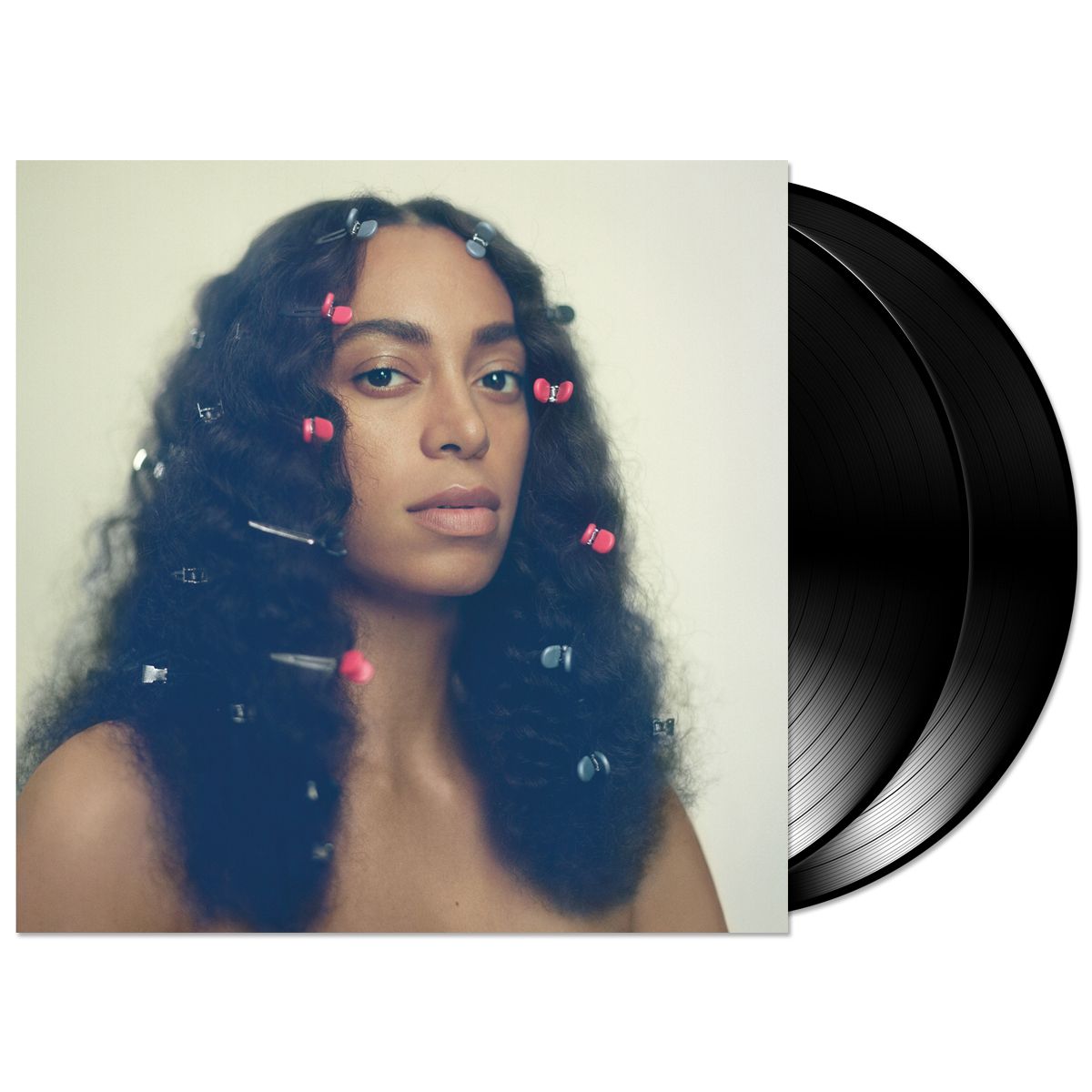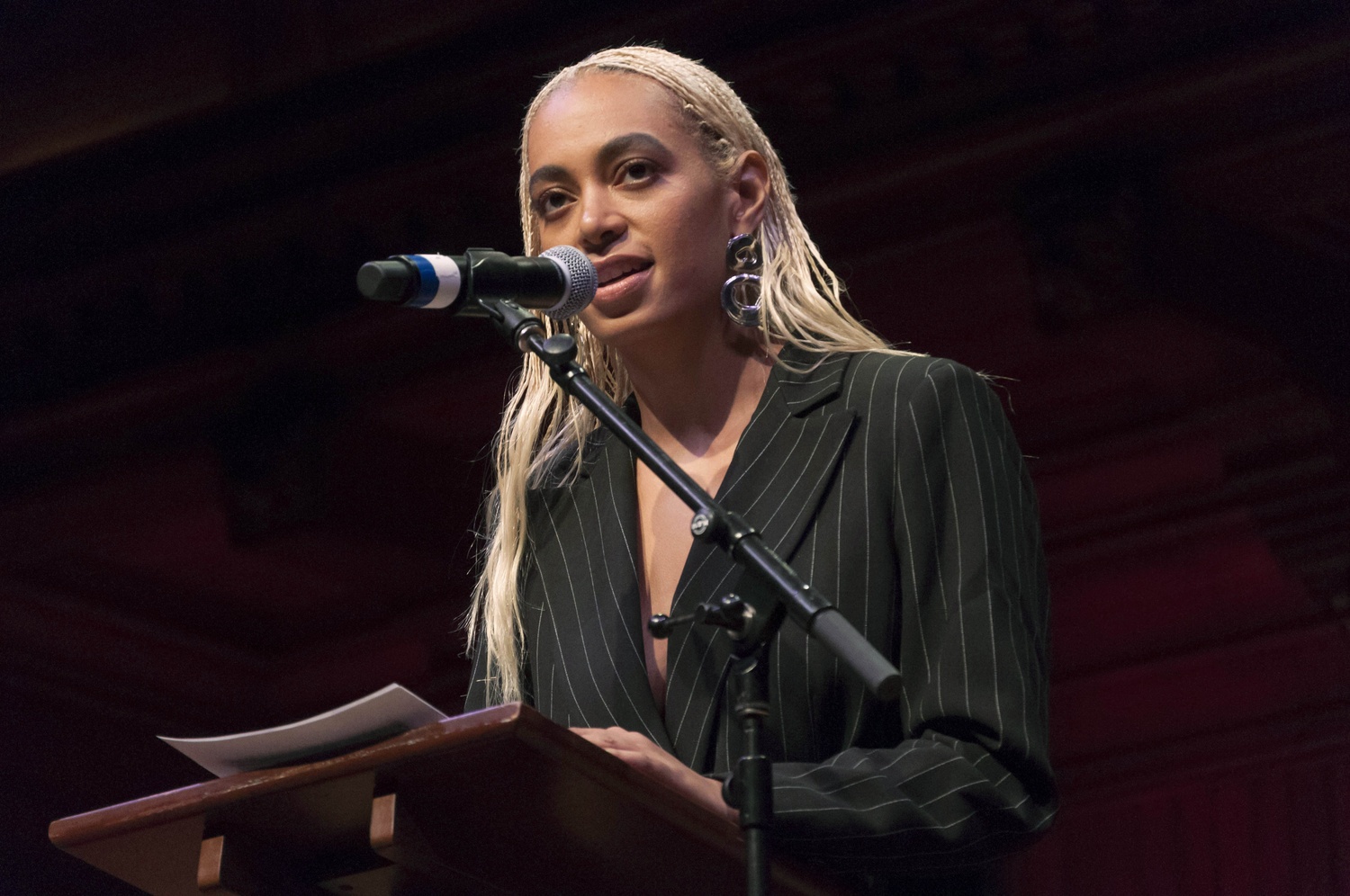“Some songs are received in a certain way, but I honestly was writing them for myself and for my healing and for my self-discovery.”

Track List
- Rise
- Weary
- Interlude: The Glory is in You
- Cranes in the Sky
- Interlude: Dad was Mad
- Mad [Explicit]
- Don’t You Wait
- Interlude: Tina Taught Me
- Don’t Touch My Hair (feat. Sampha)
- Interlude: This Moment
- Where Do We Go
- Interlude: For Us By Us
- F.U.B.U. (Feat. The-Dream & BJ The Chicago Kid)
- Borderline (An Ode to Self Care) (feat. Q-Tip)
- Interlude: I Got So Much Magic, You Can Have It (feat. Kelly Rowland & Nia Andrews)
- Junie
- Interlude: No Limits
- Don’t Wish Me Well
- Interlude: Pedestals
- Scales (feat. Kelela)
- Closing: The Chosen Ones
A Seat at The Table debuted at No. 1 on the Billboard Top 200 Chart, Apple Music and iTunes Overall Top Albums Charts. The record’s success led to Knowles’ Orion’s Rise performance series that included two sold out shows at Radio City Music Hall as well as shows at Hollywood Bowl, the Kennedy Center, the Greek Theatre, and Orpheum Theater. A portion of the Radio City Music Hall performance proceeds and all of the proceeds from her Orpheum Theater performance were donated to hurricane relief efforts.
In 2017 Solange Knowles received the American Express Impact Award during the Billboard Women in Music Awards ceremony. Solange Knowles is the first American recipient of the award.
Every person who wishes to create art that has meaning must face the Holy Ghost, metaphorically at least; she must struggle with whatever she feels called upon to create, the thing that wishes to inhabit her–That recognition, that need to reflect back, is a fundamental aspect of her work. She makes art in which black people, particularly black women, see themselves. It is not just that her live performances typically feature solely black dancers and musicians, or that her lyrics describe experiences so familiar to many black people (just listen to 2016’s “Don’t Touch My Hair,” with the lines “They don’t understand / What it means to me / Where we chose to go / Where we’ve been to know,” about that specific act of fetishization and presumption). It’s that her output is infused by a fundamental orientation — culturally, politically, psychically — to blackness.
-Ayana Mathis, The NY Times Style Magazine
This album isn’t Knowles’ first public foray into activism or assertion of her identity as a woman of color. It is more like a culmination of her activism and self-actualization. Back in 2013 she staged a peaceful protest in response to the not-guilty verdict in the Trayvon Martin case.

The well-deserved accolades for this album kept rolling in for Solange; The Harvard Foundation for Intercultural and Race Relations awarded her their artist of the year award at their 33rd Cultural Rhythms Show, an event featuring 11 cultural performances including dance, music, and spoken word. Her speech resonated powerfully with all of the young black women in attendance;
“My ancestors’ hands have built these spaces, and so I know that we belong. And so, while yes, these institutions open doors, and while I understand what the visibility as a young black woman artist standing here before you is… I also have to acknowledge that our worth cannot be invested in waiting for the moment that someone tells us that we are worthy,”
-Solange Knowles

The first song that I ever heard off of this album took my ears by storm, softly at first as it billowed over the horizon of my consciousness and made me ask myself, “Who is this??” That song was track number 2, “Weary”. The song is slow and rhythmic as it begins with the words: “I’m weary of the ways of the world.” The gentle vibrato of her voice is soothing, yet full of the weariness this song embodies. I turn to this song for spiritual rejuvenation whenever I feel weary and emotionally drained by the American zeitgeist. I think that it is important to acknowledge that this album was not made for me, a white American descended primarily from white European settlers who has never and will never inhabit the experience of being black or African American. Tracks 12 and 13 make it clear that this album is intentionally carving out a sonic space for Solange and other black people to explore what it means to be black in American today and celebrate their blackness: “All my niggas let the whole world know/Play this song and sing it on your terms/For us, this shit is for us/Don’t try to come for us.” This album is both a refuge and a magic mirror for those it speaks to directly. But that doesn’t mean that there aren’t vital lessons to be gleaned from this album by people who are not black. In the Interlude, Master P says, “I took that anger and said, ‘I’mma put it into my music.’ I tell people all the time, ‘If you don’t understand my record, you don’t understand me, so this is not for you.'” This album is a wonderful opportunity to understand the experience of someone else, someone who has perhaps grown accustomed to being utterly misunderstood. This album, to me, is an exercise in empathy. This engagement with empathy is made all the more vivid by the breath-taking emotional nuances of the music itself. Solange breathes love and power into these songs. I think she also made an effort to connect to a wide audience with this album; Many of the themes are not exclusive. Solange is full of grace and when she pours it out it sounds like the future.
“Allow us to be pro-black. Allow us to be beautiful and take pride in that. Being pro-black does not mean being anti-white. Stop making the parallels and the analogies of black history month vs. all of the other months in the year. Allow us to have that moment and, just like the album, really take pride and celebrate our journey and look at where we came from and look at where we are today. That was not that long ago. Let us relish in that and celebrate that.”
-Solange Knowles, NPR